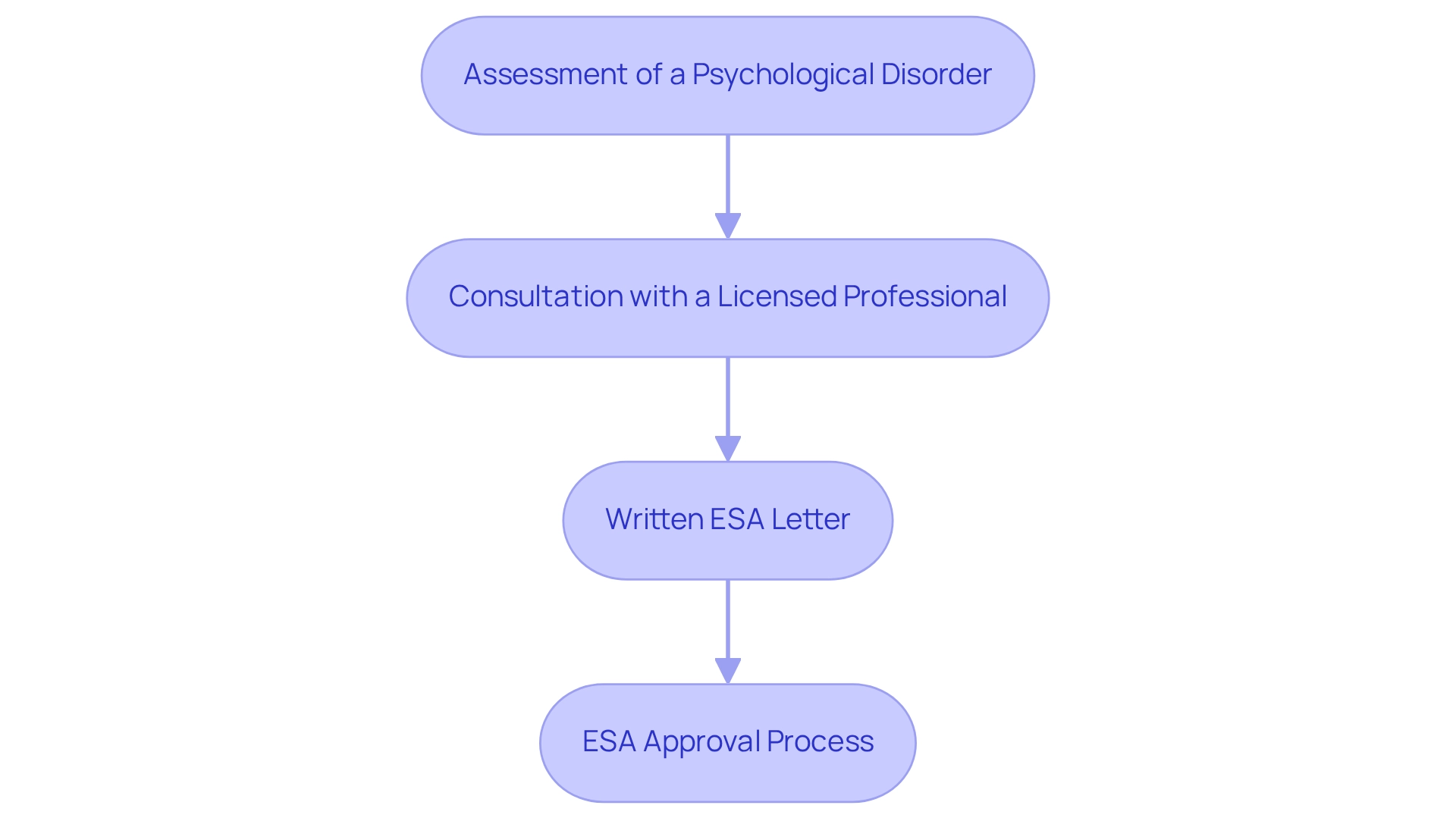

ESA Documentation: Steps to Secure Your Emotional Support Animal Letter
by Lena Park
Last updated: July 4, 2025
Verified and Approved by:
Angela Morris,
MSW, LCSW
Fact Checked

Overview
This article centers on guiding you through the essential steps to obtain an Emotional Support Animal (ESA) letter, a process that can feel overwhelming for many. We understand the emotional challenges you may face, including feelings of anxiety or isolation. By assessing your psychological needs, consulting with licensed professionals, and understanding your legal rights, you can find a path toward healing and companionship.
The evaluation process is crucial, as it helps you articulate your needs and gather the necessary documentation. Laws such as the Fair Housing Act and the Air Carrier Access Act provide important protections, ensuring that you are informed and supported throughout this journey. Knowing your rights can empower you, allowing you to navigate the process with confidence.
Remember, you are not alone in this. Many individuals have found solace and support through their ESAs, transforming their emotional landscape. As you consider this option, reflect on how an ESA could enhance your life, offering companionship and comfort during difficult times.
We hope this article reassures you that support is available, and taking these steps can lead to a more fulfilling and connected life with an Emotional Support Animal by your side.
Introduction
In a world where mental health challenges are increasingly recognized, many individuals face emotional distress that can feel overwhelming. The journey through anxiety, depression, and PTSD can be isolating, leaving one to seek comfort and stability. This is where Emotional Support Animals (ESAs) come into play, serving as vital companions that provide solace simply through their presence. Unlike service animals, which are trained for specific tasks, ESAs offer a unique form of support that can alleviate the burdens of these mental health challenges.
For those considering an ESA, understanding the process of obtaining an ESA letter is essential. This letter is not just a piece of paper; it represents a lifeline, allowing individuals to navigate the complexities of documentation requirements and legal rights that protect their access to housing and travel with their furry companions. As the demand for ESAs continues to grow, so too does the need for clarity on how to secure these important letters and the protections afforded to their owners.
Imagine the comfort of having a loving animal by your side during tough times. The bond between a person and their ESA can profoundly impact mental well-being, providing a sense of security and companionship that is often hard to find. This article will guide you through the essential steps to obtain an ESA letter, explore the legal frameworks that protect ESA owners, and highlight the transformative role these animals can play in enhancing emotional health. You are not alone in this journey; support is available, and together we can navigate the path to finding the comfort you deserve.
Define Emotional Support Animals and Their Role in Mental Health
Emotional Support Animals (ESAs) are more than just pets; they provide comfort and assistance to those navigating psychological conditions. Unlike service animals, which are specially trained to perform specific tasks, ESAs offer companionship and emotional stability simply by being present. They can help alleviate symptoms of anxiety, depression, PTSD, and other psychological disorders. The therapeutic benefits of ESAs are well-documented, as they can ease feelings of loneliness and provide a sense of security, making them invaluable for individuals facing emotional distress.
At Wellness Wag, we deeply value your privacy and adhere to the Health Insurance Portability and Accountability Act (HIPAA), ensuring that your medical information is treated with the utmost care. Understanding the role of ESA documentation is essential for those looking to navigate the process of acquiring an ESA letter, as it highlights the importance of the bond between a person and their animal in addressing emotional challenges. Moreover, Wellness Wag offers a streamlined online process for obtaining legitimate ESA documentation through our telehealth services, simplifying access to the support you need. It is crucial to recognize the differences between ESAs and service dogs, as they possess distinct legal rights and access privileges. Have you ever felt overwhelmed by your emotional struggles? Remember, you are not alone, and there are compassionate solutions available to help you on your journey.
Outline ESA Documentation Requirements and Approval Process
Obtaining an ESA letter begins with meeting specific esa documentation requirements, which can feel overwhelming for those already facing emotional challenges. These requirements typically include:
- Assessment of a Psychological Disorder: It’s essential for a certified psychological expert to assess you if you have a qualifying condition, such as anxiety, depression, or PTSD. This diagnosis is crucial, as it establishes your need for emotional support and validates your experiences.
- Consultation with a Licensed Professional: You will need to schedule a consultation with a licensed therapist, psychologist, or psychiatrist who can thoughtfully evaluate your need for an ESA. This step ensures you receive the tailored assistance that truly addresses your psychological requirements.
- Written ESA Letter: Once approved, the professional will provide a written ESA letter, which includes their license number, type, and the date it was issued. This letter serves as legal documentation for your need for an ESA (emotional support animal), allowing you to access necessary housing accommodations.
The approval process can vary slightly depending on the provider, but generally, it involves a straightforward assessment and consultation to ensure you qualify for an ESA. Remember, Emotional Support Animals play a vital role in alleviating symptoms associated with psychological conditions, fostering equal opportunities for individuals in their residential lives. You are not alone in this journey, and there is support available to help you navigate these challenges.

Detail Steps to Obtain an ESA Letter from Licensed Professionals
To obtain an ESA letter, you can follow these essential steps that aim to support your emotional well-being.
- Evaluate Your Need: Begin by reflecting on your psychological state and consider how an Emotional Support Animal (ESA) might enhance your daily life. It can be helpful to share your thoughts with a trusted friend or family member to gain perspective on your feelings.
- Find a Licensed Mental Health Professional: Look for a therapist, psychologist, or psychiatrist who is licensed in your state and ideally has experience with ESAs. Online directories and referrals from trusted sources can assist you in identifying qualified professionals. As of 2025, there are approximately 100,000 licensed practitioners in the U.S. offering ESA evaluations, providing you with a range of options for support.
- Schedule an Appointment: Once you’ve identified a professional, reach out to arrange a consultation. Be prepared to discuss your psychological background and articulate how an ESA could be beneficial in your life.
- Complete the Evaluation: During your appointment, the mental health professional will evaluate your needs. Honesty and openness about your experiences are essential for an accurate assessment. This model serves as an important risk-management strategy, ensuring that the evaluation process is conducted ethically and effectively.
- Receive Your ESA Letter: If approved, the professional will issue your ESA letter. Ensure that the ESA documentation includes all necessary details, such as their license number and the date of issuance, to validate its authenticity. At Wellness Wag, we strive to streamline this process by connecting you with a licensed medical professional for a personalized consultation and thorough evaluation.
- Keep Your Documentation Safe: Safeguard your ESA letter, as you will need to present it for housing or travel accommodations. Having ESA documentation readily available is crucial for navigating pet restrictions under laws like the Fair Housing Act and the Air Carrier Access Act. It’s important to note that in Florida, presenting a fake ESA can lead to serious consequences, including up to 60 days in jail and a fine of up to $500, which highlights the importance of following the correct procedures.
Understanding this process is vital, especially given the increasing scrutiny around ESA certifications. In California, for example, having an ESA should help facilitate improved daily living activities and social interactions, making it imperative to adhere to the correct procedures. Furthermore, the absence of standardized guidelines for ESA documentation has resulted in inconsistencies, highlighting the importance of obtaining your letter from a licensed professional. At Wellness Wag, we offer an effortless online process for acquiring a legitimate ESA documentation letter, ensuring that you receive your documentation promptly and efficiently.
Explain Legal Rights and Protections for ESA Owners
ESA owners often face significant challenges in securing their rights in housing and travel contexts. Fortunately, a robust framework of legal protections is in place to safeguard these individuals. Understanding these protections can provide much-needed reassurance and support.
The Fair Housing Act (FHA) is a vital piece of federal legislation that mandates landlords to provide reasonable accommodations for persons with disabilities, including allowing ESAs in properties that typically prohibit pets. This law protects ESA owners from being charged extra fees or deposits, ensuring that they can obtain essential support without financial strain. In 2025, over 10,000 complaints were filed under the FHA specifically related to ESA access, highlighting the necessity of these legal frameworks.
Similarly, the Air Carrier Access Act (ACAA) requires airlines to accommodate passengers traveling with ESAs, allowing them to fly with their beloved companions in the cabin. While airlines may have specific documentation requirements, the ACAA is designed to ensure that ESA documentation allows owners to travel without anxiety. Legal experts encourage ESA owners to be aware of their rights under this act to prevent potential discrimination during air travel, and they should also familiarize themselves with the ESA documentation that many states have enacted to further protect ESA owners. It’s crucial for individuals to familiarize themselves with their state’s specific laws regarding ESA documentation to fully understand their rights and protections. For instance, some states have provisions that enhance the protections offered by the FHA and ACAA.
Real-life stories illustrate how ESA owners have successfully navigated these legal avenues to secure their rights. One recent case involved an ESA owner who faced eviction due to their landlord’s refusal to accept their ESA. After filing a complaint with the U.S. Department of Justice, the landlord was compelled to comply with the FHA, allowing the owner to remain in their home with their animal.
Legal experts emphasize that ESA owners have the right to seek redress for violations of their rights, whether through private lawsuits or by filing complaints with the U.S. Department of Justice. This legal recourse is essential for ensuring compliance with the FHA and ACAA, allowing ESA owners to enjoy the companionship of their animals without facing discrimination. By being informed about their rights, ESA owners can effectively advocate for themselves and ensure they receive the support their animals provide. For further information, the ADA Knowledge Translation Center offers valuable resources on service animals and assistance animals.
Conclusion
Emotional Support Animals (ESAs) are vital companions for those grappling with mental health challenges, offering comfort and emotional stability through their mere presence. Unlike service animals, ESAs do not perform specific tasks, yet they play a crucial role in alleviating symptoms associated with anxiety, depression, and PTSD. Understanding how to obtain an ESA letter is essential, as it provides legal documentation and reinforces the bond between an individual and their animal, showcasing the transformative impact of this relationship on mental well-being.
The journey to securing an ESA letter involves several important steps, including:
- A thorough evaluation by a licensed mental health professional who can assess the individual’s needs.
- Ensuring that the support provided by the ESA is both appropriate and beneficial.
- Paving the way for essential legal protections under laws like the Fair Housing Act and the Air Carrier Access Act.
These regulations safeguard the rights of ESA owners, allowing them access to housing and travel accommodations without facing undue discrimination or financial burden.
Ultimately, the presence of an ESA can be life-changing, offering companionship and a sense of security that enhances emotional health. As awareness of mental health issues continues to grow, so does the recognition of the importance of these animals in providing support. For those navigating the complexities of obtaining an ESA letter and understanding their rights, it is crucial to seek guidance from reputable sources. Remember, support is available, and the bond with an Emotional Support Animal can be a powerful ally in the journey toward improved mental health and well-being.
Frequently Asked Questions
What are Emotional Support Animals (ESAs)?
Emotional Support Animals (ESAs) are animals that provide comfort and assistance to individuals dealing with psychological conditions. They offer companionship and emotional stability by simply being present.
How do ESAs differ from service animals?
Unlike service animals, which are specially trained to perform specific tasks for individuals with disabilities, ESAs do not have specific training and primarily provide emotional support and companionship.
What psychological conditions can ESAs help alleviate?
ESAs can help alleviate symptoms of anxiety, depression, PTSD, and other psychological disorders.
What are the documented benefits of having an ESA?
The therapeutic benefits of ESAs include easing feelings of loneliness, providing a sense of security, and offering emotional stability, making them invaluable for individuals facing emotional distress.
How does Wellness Wag ensure the privacy of clients seeking ESA documentation?
Wellness Wag adheres to the Health Insurance Portability and Accountability Act (HIPAA), ensuring that clients’ medical information is treated with the utmost care.
What is the importance of ESA documentation?
ESA documentation is essential for individuals looking to acquire an ESA letter, as it highlights the importance of the bond between a person and their animal in addressing emotional challenges.
How does Wellness Wag facilitate obtaining ESA documentation?
Wellness Wag offers a streamlined online process for obtaining legitimate ESA documentation through their telehealth services, simplifying access to the support needed.
Why is it important to understand the legal rights of ESAs?
It is crucial to recognize the differences between ESAs and service dogs, as they possess distinct legal rights and access privileges.
Certify Your Emotional Support Animal Today

Why You Can Rely on Us?
At Wellness Wag, we believe your pet deserves care rooted in both science and compassion. Each article is carefully researched, written in clear language for pet owners, and then reviewed by qualified professionals to ensure the information is evidence-based, current, and practical for real-life care. Our goal is to help you feel confident in making informed decisions about your pet’s health and well-being.
Reviewed by
Angela Morris, MSW, LCSW
Angela is a licensed clinical social worker with 20 years of experience in patient advocacy and community mental health. She has assisted numerous clients with ESA evaluations and brings a deep understanding of disability accommodations, ensuring that all information is accurate, supportive, and practical.

Written by :
Lena Park
Last Updated :
July 4, 2025












